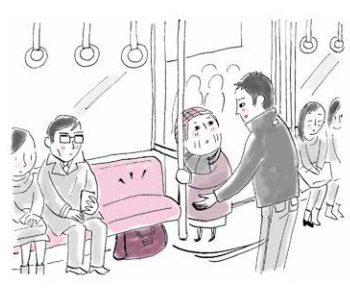On a Certain Day at a Certain Place in Japan ある日、ある場所の日本
The other day I got (1 on ) a train at a terminal station.
先日、あるターミナル駅で電車に乗りました。
It was about five minutes (2 before ) departure, but the seats were already occupied and many passengers were standing.
出発まで5分ほどありましたが、すでに座席は埋まり立っている乗客がたくさんいました。
I stood (3 by ) a door. An elderly lady was also standing nearby.
私はドアの側に乗客が立ちました。近くにはおばあさんも立っていました。
A young man sitting nearby saw her and saying, “Please,” gave (4 up) his seat and left.
近くに座っていた若者が彼女を見て「どうぞ」と言って席を譲り、立ち去りました。
When the elderly lady thanked him and sat down, she discovered a bag (5 under ) the seat.
おばあさんがお礼を言い座ろうとすると、座席の下にバッグがありました。
The elderly lady asked the middle aged man (6 next to ) her, “Is this yours?”
おばあさんは、隣の中年男性に「これ、お宅様のですか」と聞きました。
The man shook his head and replying, “This must be the young man’s,” left his own bag (7 on )the seat, took the young man’s bag and ran (8 after ) him.
男性は首を横に振り、「あの若者のものですよ、きっと」と言って、自分のバッグを座席に置き、若者のバッグを持って彼を追いました。
However, when he looked (9 around), he could not see the young man.
しかし、あたりを見まわしましたが、若者は見つかりません。
Fortunately a station employee was passing (10 on ) the platform, so he explained the situation and handed it over.
そこに運よくホームに駅員が通りかかったので、男性は事情を説明し、バッグを手渡しました。
When the middle aged man returned (11 to ) his seat, the young man returned in a rush and asked in a loud voice, “Wasn’t there a bag here?”
男性が席に戻ると、若者があわてて戻ってきて「ここにバッグがありませんでしたか」と大声で聞きました。
When the middle aged man explained to the young man that he had handed it (12 over ) to a station employee, the young man looked relieved.
男性が駅員に渡したと言うと、若者はほっとした表情を浮かべました。
And said, “Thank you very much,” then made his way (13 to ) the station’s lost property office.
そして「ありがとうございました」と言って駅の事務所へ向かいました。
(14 Before ) long the departure bell rang, and the train left the station.
まもなくして発車のベルが鳴り、電車は走りはじめました。
I thought (15 to ) myself that it would be good if the Japanese culture (16 of ) consideration towards others could continue forever.
私は、このような他人を思いやる日本の文化がいつまでも続くといいなと思いました
先日、あるターミナル駅で電車に乗りました。
It was about five minutes (2 before ) departure, but the seats were already occupied and many passengers were standing.
出発まで5分ほどありましたが、すでに座席は埋まり立っている乗客がたくさんいました。
I stood (3 by ) a door. An elderly lady was also standing nearby.
私はドアの側に乗客が立ちました。近くにはおばあさんも立っていました。
A young man sitting nearby saw her and saying, “Please,” gave (4 up) his seat and left.
近くに座っていた若者が彼女を見て「どうぞ」と言って席を譲り、立ち去りました。
When the elderly lady thanked him and sat down, she discovered a bag (5 under ) the seat.
おばあさんがお礼を言い座ろうとすると、座席の下にバッグがありました。
The elderly lady asked the middle aged man (6 next to ) her, “Is this yours?”
おばあさんは、隣の中年男性に「これ、お宅様のですか」と聞きました。
The man shook his head and replying, “This must be the young man’s,” left his own bag (7 on )the seat, took the young man’s bag and ran (8 after ) him.
男性は首を横に振り、「あの若者のものですよ、きっと」と言って、自分のバッグを座席に置き、若者のバッグを持って彼を追いました。
However, when he looked (9 around), he could not see the young man.
しかし、あたりを見まわしましたが、若者は見つかりません。
Fortunately a station employee was passing (10 on ) the platform, so he explained the situation and handed it over.
そこに運よくホームに駅員が通りかかったので、男性は事情を説明し、バッグを手渡しました。
When the middle aged man returned (11 to ) his seat, the young man returned in a rush and asked in a loud voice, “Wasn’t there a bag here?”
男性が席に戻ると、若者があわてて戻ってきて「ここにバッグがありませんでしたか」と大声で聞きました。
When the middle aged man explained to the young man that he had handed it (12 over ) to a station employee, the young man looked relieved.
男性が駅員に渡したと言うと、若者はほっとした表情を浮かべました。
And said, “Thank you very much,” then made his way (13 to ) the station’s lost property office.
そして「ありがとうございました」と言って駅の事務所へ向かいました。
(14 Before ) long the departure bell rang, and the train left the station.
まもなくして発車のベルが鳴り、電車は走りはじめました。
I thought (15 to ) myself that it would be good if the Japanese culture (16 of ) consideration towards others could continue forever.
私は、このような他人を思いやる日本の文化がいつまでも続くといいなと思いました


 RSS Feed
RSS Feed